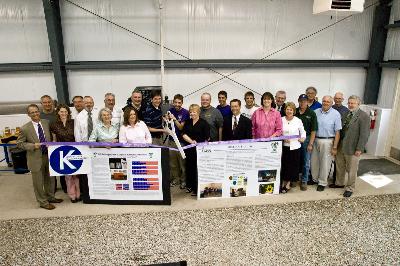Bulldog Biodiesel Receives Grant from Northeast Missouri Solid Waste District
In response to the ever-increasing demand for energy, a group of Truman students and their faculty mentors are taking strides to be a leader in alternative fuel research with the Bulldog Biodiesel program. To aid in making their program successful, the Truman team recently received a grant worth more than $34,000 from the Northeast Missouri Solid Waste District.
Associate professor of agriculture Tom Marshall and associate professor of chemistry Barbara Kramer co-authored the proposal for the grant, which runs through June 2010.

Students from Truman’s Bulldog Biodiesel program prepare to cut a ribbon celebrating the recent grant awarded to the organization by the Northeast Missouri Solid Waste District. Truman faculty and staff, along with representatives from the Northeast Missouri Solid Waste District and leaders from the Kirksville community, were on hand to witness the event.
Bulldog Biodiesel began in the fall of 2007 as a collaborative effort between the agriculture science senior practicum and the American Chemical Society. The group quickly garnered the interest and support of many students and faculty within the University. Thanks to the assistance of the Agriculture Science Development Fund, the group was able to purchase a BioPro 190 automated processor in January 2008, and has since been producing biodiesel with waste vegetable oil donated by several cafeterias and community restaurants. The BioPro 190 allows Bulldog Biodiesel to make and clean approximately 50 gallons of fuel every 48 hours.
Within the area of alternative fuels, the sources of biofuels have become a hotly debated topic. Many people contend that growing crops for the sole purpose of creating fuel is too inefficient to reap any benefits. Bulldog Biodiesel is able to circumvent this argument because all of the input vegetable oil is collected from area restaurants’ fryers and would have otherwise been discarded in a landfill.
Biodiesel is made using a simple chemical process called transesterification, which converts waste vegetable oil and methanol into fuel. The reaction can be carried out with any fat or oil, which are all very similar at a molecular level, consisting of a glyceride backbone and three fatty acid tails. In the presence of a catalyst-sodium hydroxide or potassium hydroxide-the starting oil is chemically cut in half to give one part glycerol and three parts biodiesel. The resulting glycerol can be used for any number of purposes, including the manufacture of soap.
The glycerol currently produced is being used by the Truman State University Compost Project, and the biodiesel is being burned in tractors and trucks at the University Farm.
In the fall of 2008 Bulldog Biodiesel set forth a three-year plan to gradually increase production and use. Goals included increases in oil collection, number of student workers and shifts per week.
Eventually, all University Farm and Physical Plant vehicles will be powered by Bulldog Biodiesel. At some point, the purchase of a diesel generator will allow the production facility to be powered exclusively by biodiesel-generated electricity. The group would also like to obtain and operate a biodiesel-powered shuttle that makes regular stops at stores throughout Kirksville one to two days per week.
Associate professor of agriculture Tom Marshall and associate professor of chemistry Barbara Kramer co-authored the proposal for the grant, which runs through June 2010.

Students from Truman’s Bulldog Biodiesel program prepare to cut a ribbon celebrating the recent grant awarded to the organization by the Northeast Missouri Solid Waste District. Truman faculty and staff, along with representatives from the Northeast Missouri Solid Waste District and leaders from the Kirksville community, were on hand to witness the event.
Bulldog Biodiesel began in the fall of 2007 as a collaborative effort between the agriculture science senior practicum and the American Chemical Society. The group quickly garnered the interest and support of many students and faculty within the University. Thanks to the assistance of the Agriculture Science Development Fund, the group was able to purchase a BioPro 190 automated processor in January 2008, and has since been producing biodiesel with waste vegetable oil donated by several cafeterias and community restaurants. The BioPro 190 allows Bulldog Biodiesel to make and clean approximately 50 gallons of fuel every 48 hours.
Within the area of alternative fuels, the sources of biofuels have become a hotly debated topic. Many people contend that growing crops for the sole purpose of creating fuel is too inefficient to reap any benefits. Bulldog Biodiesel is able to circumvent this argument because all of the input vegetable oil is collected from area restaurants’ fryers and would have otherwise been discarded in a landfill.
Biodiesel is made using a simple chemical process called transesterification, which converts waste vegetable oil and methanol into fuel. The reaction can be carried out with any fat or oil, which are all very similar at a molecular level, consisting of a glyceride backbone and three fatty acid tails. In the presence of a catalyst-sodium hydroxide or potassium hydroxide-the starting oil is chemically cut in half to give one part glycerol and three parts biodiesel. The resulting glycerol can be used for any number of purposes, including the manufacture of soap.
The glycerol currently produced is being used by the Truman State University Compost Project, and the biodiesel is being burned in tractors and trucks at the University Farm.
In the fall of 2008 Bulldog Biodiesel set forth a three-year plan to gradually increase production and use. Goals included increases in oil collection, number of student workers and shifts per week.
Eventually, all University Farm and Physical Plant vehicles will be powered by Bulldog Biodiesel. At some point, the purchase of a diesel generator will allow the production facility to be powered exclusively by biodiesel-generated electricity. The group would also like to obtain and operate a biodiesel-powered shuttle that makes regular stops at stores throughout Kirksville one to two days per week.

